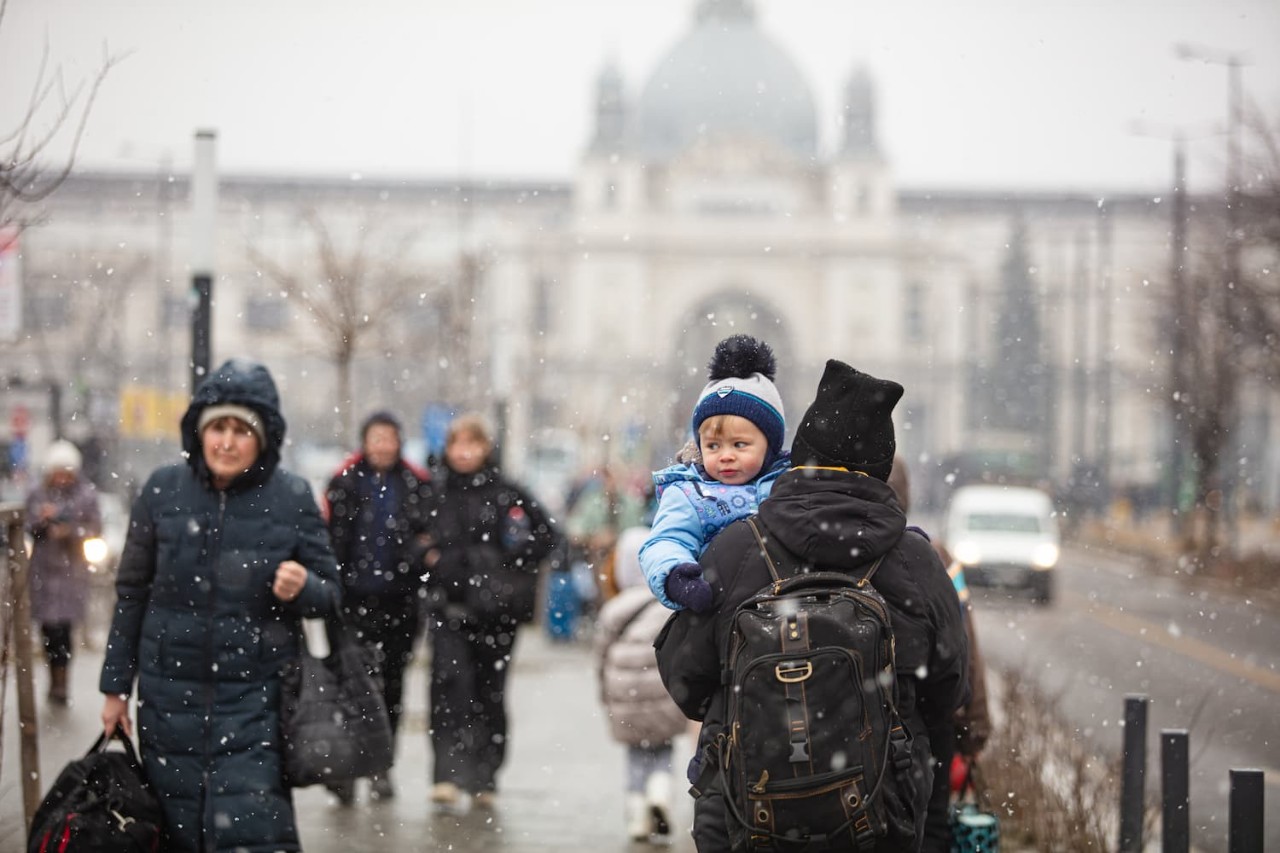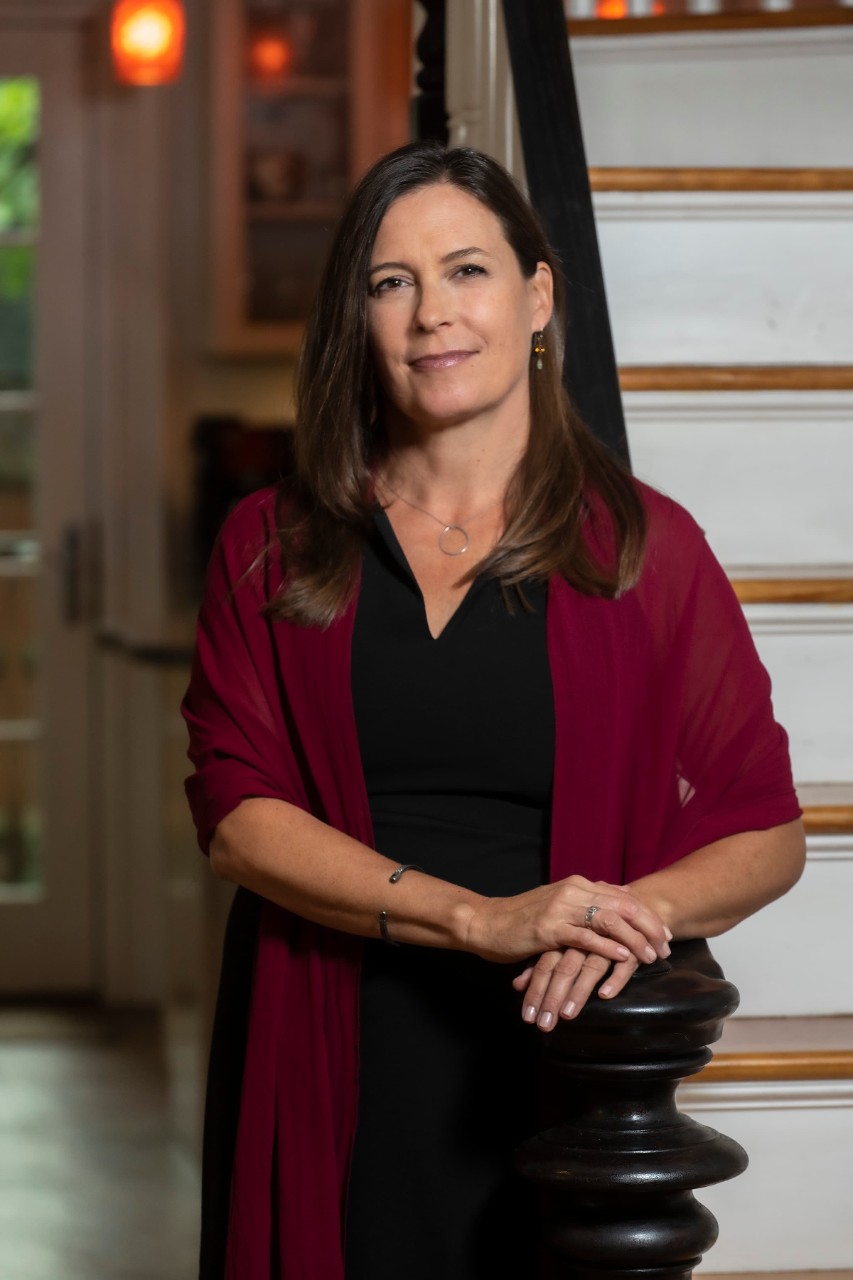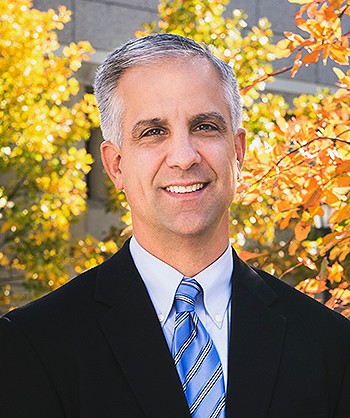
Ukrainian refugees on Lviv railway station wait for a train to escape to Europe on March 7, 2022. Photo by iStock.
The Russian invasion of Ukraine is taking a psychological toll on children in the war-torn country, according to two professors in the Boston College School of Social Work, and could have long term consequences for the mental health of youth who are caught up in the conflict.
But parents and other caregivers have the power to protect their children and help them cope with the trauma of war, the BC experts say.
“During times of unpredictability, what matters most is the support from loving attachment figures and extending routines and predictability as much as possible,” says Theresa Betancourt, the Salem Professor in Global Practice and director of the Research Program on Children and Adversity.
Betancourt advises parents to stick to routines held before the war, noting that keeping the same mealtimes, bedtimes, and playtimes can reduce stress for children and their caregivers. Parents, she says, should give their kids something to look forward to and provide opportunities for them to express themselves through art, play, and storytelling.
“The more parents can be emotionally available for their children, the better,” says Betancourt, who designs programs to improve the mental health of children in Rwanda, Sierra Leone, and the United States who have been displaced from their homes, traumatized by war, or affected by HIV. “It is important to make the home a place that allows children to be heard.”
More than 120 children have been killed in the war, according to the prosecutor’s office in Ukraine, and over 1.5 million kids have fled the country. Humanitarian organizations report that six million children remain in Ukraine, subject to horrors of war like exploding bombs, bloodied bodies, and destroyed homes. Many children are now seeking refuge inside buildings that are coming under attack, left without food, water, and healthcare. And more than 460 schools and 40 hospitals have been damaged since Russian President Vladimir Putin launched what he called a “special military operation” into the country on Feb. 24.
Betancourt says that parents provide stability during such traumatic events, underscoring research findings presented by psychoanalysts Anna Freud and Dorothy Burlingham in their 1943 book War and Children. “From very early research on children and war we know that attachment relationships are fundamental to helping children navigate frightening events,” she says.
Freud and Burlingham studied children at three nurseries in London who were orphaned or evacuated during World War II. What they found is that the loving presence of caregivers seemed to mitigate the effect that attacks, such as bombings, had on the well-being of children. “If these bombing incidents occur when small children are in the care either of their own mothers or a familiar mother substitute, they do not seem to be particularly affected by them,” they write. “Their experience remains an accident, in line with other accidents of childhood.”

Theresa Betancourt
Scott Easton, an associate professor who chairs the Health and Mental Health fields of practice, describes Ukraine as a “highly collective culture” and says that extended family members or neighbors often assume communal responsibilities for caring for children. This means that parents have opportunities to take breaks from 24/7 oversight of their kids to focus on their mental health, receive support from other adults, or express their own emotions, whether it’s rage, anguish, pain, or horrifying fear.
“That is a natural cultural strength that can be capitalized on, as adults can provide much-needed parenting breaks for others during the day, which can be reciprocated later,” says Easton, who co-chairs the Trauma Integration Initiative, a holistic program that prepares students to help clients cope with trauma while guarding themselves against its effects. “This could allow the parent an opportunity to momentarily separate from the young child and go for a walk, safely express their own emotions, and potentially receive social support from another adult experiencing similar trauma.”
Easton points out that more than half of Ukrainian people identify as Orthodox Christian or Catholic, noting that the belief that God is present in the darkest days can be an asset for parents in this time of crisis. As he puts it, “Connecting to a higher power, in specific religious traditions or in more general spiritual practices, can help nurture hope.”
Betancourt says that children who don’t have caregivers to protect them from the horrors of war face an increased risk of trafficking—and that’s no small problem when you consider that almost one child per second in Ukraine is becoming a refugee of war. Missing Children Europe, an umbrella organization for two dozen child protection groups across the continent, told The Guardian that unaccompanied minors are continuing to disappear at the borders of Ukraine.
“In some situations of family separation,” says Betacourt, “children who are not well connected to caregivers and are not able to be monitored can be at risk of being manipulated or drawn into dangerous situations by third parties that aim to engage youth in violence or trafficking.”

Scott Easton
Ukrainian children without caregivers may also go on to suffer from toxic stress, which can harm their body and brain and cause lifelong health problems. Betancourt says this distress can show up in different ways depending on the age of the child. In severe cases of neglect, babies might stop feeding, crying, or responding to stimuli. Toddlers may get excessively clingy. Prepubescent children may revert to the behavior of young kids, such as wetting the bed or sucking their thumb. Older children may have nightmares or emotional outbursts.
In a study of children who had been evacuated from Finland to Sweden during World War II, Betancourt found that the effects of parental separation lingered long into adulthood. Many of the kids in the study had high rates of psychiatric hospitalizations and suicidality, especially women.
“Repeat toxic stress exposures can affect the developing brain of children and have lifelong consequences for learning, behavior, and health,” she says.
Easton adds that “a large body of research confirms that horrific, traumatic events can have long-lasting effects.” His research on adults who were sexually abused in childhood by priests or other trusted adults, for example, showed elevated rates of depression and anxiety persisted well into middle-age and older adulthood. “Planning for the longer-term mental health needs of the Ukrainian population,” he reasoned, “is desperately needed right now.”


